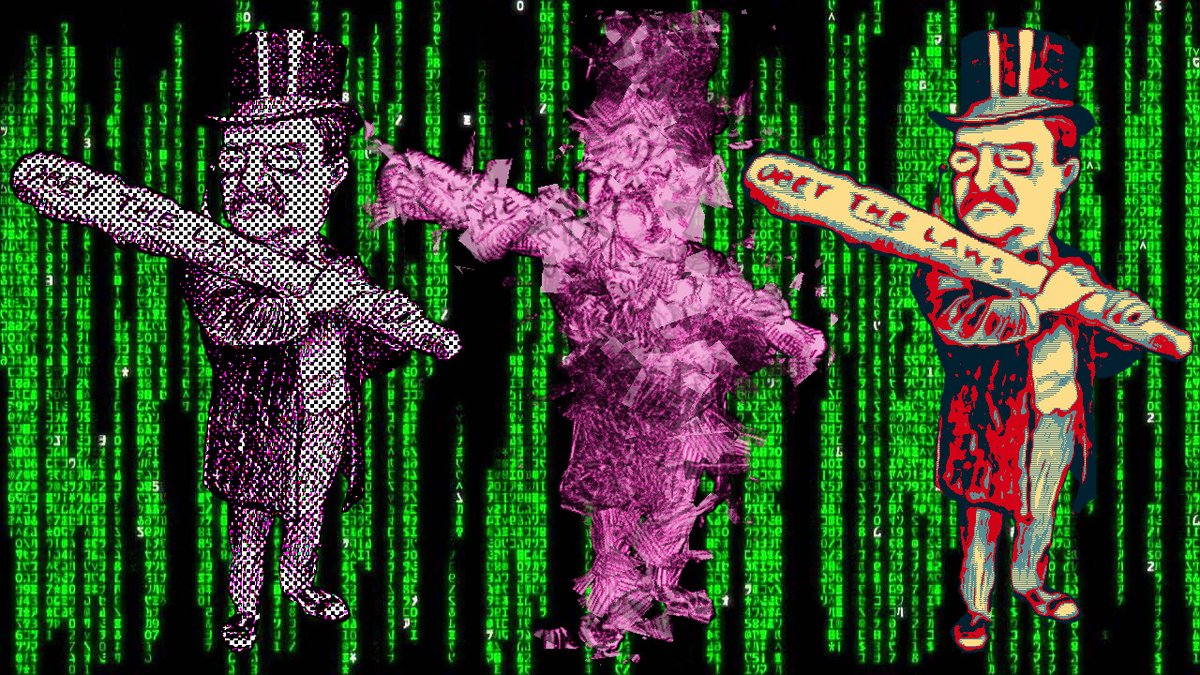America has passed four major antitrust bills since the Sherman Act of 1890. Each bill makes it clear that monopolism is a problem in and of itself - that allowing power to be concentrated into few, unaccountable hands perverts public policy and undermines the nation.
1/
1/
For generations, American regulators fought monopolies because they were monopolies. But in the early 1980s, a disgraced Nixonite criminal named Robert Bork became Ronald Reagan's court sorcerer, backed by a coalition of ultra-wealthy plutes.
2/
2/
Bork claimed that if you stared at the Sherman Act and its successors long enough, eventually you would have a holy revelation and learn that the lawmakers who crafted these bills - and spoke explicitly about their distrust of monopolies - actually really LIKED monopolies.
3/
3/
Bork claimed these lawmakers weren't anti-monopoly, they just hated BAD monopolies - monopolies that harmed "consumer welfare," which he defined as "monopolies that make prices go up."
4/
4/
Now, proving that a monopoly made prices go up (as opposed to prices increasing for other reasons) is effectively impossible, so Bork's doctrine meant that even when prices went up and quality fell, monopolies were almost totally insulated from legal enforcement.
5/
5/
What's more, since Borkism concerns itself solely with harms to buyers, monopolists could heap unlimited abuse on suppliers - workers, contractors, small businesses that got trampled and destroyed by monopolists.
6/
6/
Bork's paymasters created a re-education camp for judges, an annual "continuing education" seminar in Florida, the Manne Seminars, which trained 40% of the federal bench on Borkism, ensuring that the antitrust cases that made it to court died there.
https://crookedtimber.org/2018/10/18/law-and-economics/
7/
https://crookedtimber.org/2018/10/18/law-and-economics/
7/
Borkism has created monopolies in ever sector of the economy, and was exported to the rest of the world - even in the EU, where the law explicitly rejects Bork's doctrines and calls for fighting monopolies per se, they act as though Borkism was the law of the land.
8/
8/
Borkism is a cult with a business-model: making the richest, most ruthless privateers of the business world much, much richer, and so it has endless "philanthropic" backers who fund its spread.
9/
9/
But Borkism has run up against the limits of human tolerance. Finally, the political will to fight monopolies is stirring, and while it's coming first for Big Tech, the wave will be hard to stop, especially if we help it along into every other sector of the economy.
10/
10/
The Competition and Antitrust Law Enforcement Reform Act (CALERA) is @amyklobuchar's proposal to overhaul - and restore - antitrust law to fitness for purpose, so that it can once again be used to fight the corrupting influence of monopolies.
https://www.klobuchar.senate.gov/public/_cache/files/e/1/e171ac94-edaf-42bc-95ba-85c985a89200/375AF2AEA4F2AF97FB96DBC6A2A839F9.sil21191.pdf
11/
https://www.klobuchar.senate.gov/public/_cache/files/e/1/e171ac94-edaf-42bc-95ba-85c985a89200/375AF2AEA4F2AF97FB96DBC6A2A839F9.sil21191.pdf
11/
In addition to massively expanding funding for anittrust enforcement at the DoJ and FTC, the bill follows Germany's recent example in reversing the burden of proof for mergers - it requires large companies buying or merging with others to prove they WON'T create a monopoly.
12/
12/
More importantly, Klobuchar's bill requires regulators to consider "monopsony" (buying) power, in addition to monopoly (selling) power.
https://arstechnica.com/tech-policy/2021/02/klobuchar-targets-big-tech-with-biggest-antitrust-overhaul-in-45-years/
13/
https://arstechnica.com/tech-policy/2021/02/klobuchar-targets-big-tech-with-biggest-antitrust-overhaul-in-45-years/
13/
Monopsony is far more dangerous that monopoly - buyers with even small market shares (10-20%) can squeeze workers and suppliers. Incorporating monopsony into US antitrust practice will legally require regulators to protect workers and small businesses for the first time.
14/
14/
Finally, the bill expands anti-monopoly enforcement to include a wide range of anticompetitive tactics: "exclusionary conduct" (like banning a competing seller from API keys, or inclusion in App Stores or Amazon Marketplace).
15/
15/
This mirrors the intent behind the EU's sweeping Digital Service and Digital Markets Acts, which ban "self-preferencing" and other conduct that allows a monopolist to maintain its monopoly by crushing competitors, rather than by making the best products at the best prices.
16/
16/
This is A Big Fucking Deal.
It's not perfect - it could use some structural separation and a section on remedies that includes interoperability mandates and other tools for 21st century trustbusting - but it's a profound shift in the foundation of US economic policy.
17/
It's not perfect - it could use some structural separation and a section on remedies that includes interoperability mandates and other tools for 21st century trustbusting - but it's a profound shift in the foundation of US economic policy.
17/
If passed, it marks the first time since the Reagan years that industrial regulation will prioritize pluralism, worker rights, and local self-determination over unlimited ivory-handled back-scratcher budgets for corporate shareholders.
eof/
eof/

 Read on Twitter
Read on Twitter


